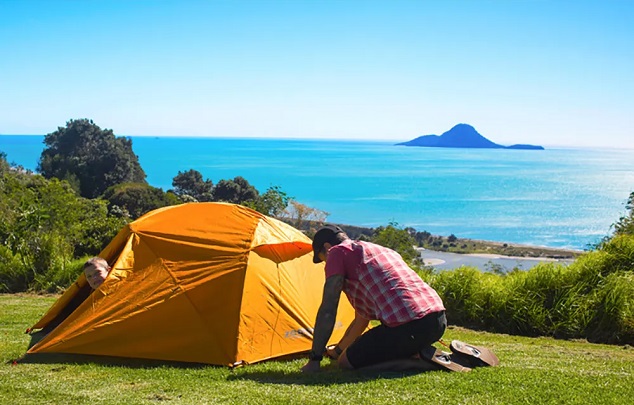Contents
Planning on hiking across the country? Well, that’s a thrilling adventure, isn’t it? So, if you are doing so, you do want to pack a lightweight tent that is easy to carry around. After all, you don’t want the weight of your backpack to get in the way of your trip, but you still want a good shelter that will keep you safe and warm.
To make the most of this, it’s important to find a hiking tent that’s lightweight, easy to pack and simple to set up, so you can venture into nature with confidence and make your experience enjoyable. Also, when choosing one pay attention to height, width, length and price to ensure you’re making the best decision for yourself.
What is a Hike Tent?
A hike tent is not your regular tent. These shelters are specifically designed to be lightweight and compact so they can be easy to pack into a rucksack and you won’t feel the heaviness like you would with a standard tent. While they are indeed smaller than regular tents, you would think that are not spacious enough. Quite the contrary, the construction is minimalist with a purpose – so they have enough room to comfortably accommodate more than two people and all of your essentials.
Another feature that sets these tents apart from standard ones is that they are built from lightweight materials that might seem flimsy at first glance. However, this is not the case. Despite their minimalist look and weight, they are built to hold up against wind and other weather elements. You will also find that many models are waterproof so you can really rest assured that you stay dry and warm even when the weather takes a turn for the worse.
With that being said, you get a clear picture of why investing in light hiking tents is a smart choice. You’ll notice the difference yourself on your next camping trip. Less weight to carry, a safe and reliable shelter, and the peace of mind you have when you know that you’re prepared for whatever nature throws your way is all guaranteed.
Choose Your Hiking Tent: Factors to Consider

Material
When picking a hike tent, the first thing to think about is the material. It’s super important because it determines how well the tent can protect you from the rain, wind and sun. the material doesn’t need to be heavy-duty like canvas. It should be lightweight but still strong enough to handle the outdoors.
That’s why nylon and polyester are great options. They are lightweight and easy to carry around, which is what you need for hiking. Most of these fabrics have also waterproof coating so you can stay dry even in pouring rain.
Look for tent poles made from aluminium or carbon fibre as they are lightweight but strong enough to hold up the tent securely. You will also love the fact that some tents even have UV protection, so you won’t have to worry about getting too much sun while inside. In the end, the material really matters because it’s one thing that can really make or break your camping trip. So, stay comfortable and stress-free.
Size: Width, Length, and Height
Even though hiking tents are smaller than regular tents, they still come in different sizes to fit your needs. They are designed to be compact and keep the weight down, but they should still give you enough space to pack your gear and other belongings. This is particularly important if you’re planning to share the tent with someone else, especially if you plan on being inside, more than two people.
If you’re camping with a group and someone from your group is tall, look for a tent with extra height and width so everyone feels comfortable and vice versa. If it’s just you and you’re more petite, a smaller tent will work perfectly well for you. The key is to think how much space you will need for yourself and your companions and for your backpacks, so you can look for what really suits you.
Weight and Portability
While these are lightweight tents for hiking, the actual weight can vary depending on the size. Some may be a bit heavier than others, but most still weigh under 3 kg, making them super easy to carry and saving space in your backpack.
Look for designs that minimise bulk. There are plenty of minimalist options that offer enough room for sleeping and storing your gear without feeling like you’re lugging around extra weight. These tents are perfect for hikers who want comfort and practicality, and you’ll barely notice you’re carrying one.
Ventilation Systems
Yes, ventilation plays a huge role in how comfortable you’ll feel inside your tent. When picking lightweight tents for hiking, make sure to choose ones with mesh panels, windows, or vents. These features let fresh air circulate, even during the hottest summer days.
Good ventilation isn’t just about staying cool, it is also about preventing moisture buildup and those unpleasant odours that can make your tent feel stuffy. A well-ventilated tent makes a big difference, keeping your camping experience fresh and enjoyable, no matter the weather.
Price
You can find tents as cheap as $50 to $80, and up – it really depends on your budget and how much you’re willing to spend. Think about how often you’ll use the tent, where you plan to camp, and the weather conditions.
If you’re an occasional camper, there’s no need to splurge on an expensive tent. However, if you’re a regular hiker who spends a lot of time outdoors, it’s worth investing in a high-quality tent. While the upfront cost might be higher, these tents are built to last and offer great value in the long run.





Comments are closed.